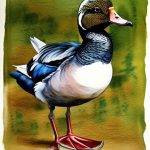The Nova Scotia Duck Tolling Retriever, also known as the Toller, is a medium-sized, intelligent, and energetic breed that originated in the early 19th century in the Little River District of Nova Scotia, Canada. This breed was developed to lure and retrieve waterfowl for hunters by playing and splashing along the shoreline, hence the name “tolling.” Tollers are known for their distinctive red coat, which is often accompanied by white markings on the chest, feet, and tail tip. They are highly versatile and excel in various dog sports such as agility, obedience, and flyball. Tollers are also excellent swimmers and have a strong retrieving instinct, making them great companions for outdoor activities such as hiking, swimming, and hunting. They are loyal, affectionate, and make great family pets with their playful and outgoing nature.
The Toller is a relatively healthy breed with a life expectancy of 12-14 years. However, they are prone to certain health issues such as hip dysplasia, progressive retinal atrophy, and autoimmune disorders. Regular exercise, mental stimulation, and a balanced diet are essential for maintaining their overall health and well-being. Due to their high energy levels and intelligence, Tollers require consistent training and socialization from an early age to prevent behavioral issues. They thrive in an active household where they can participate in various activities and receive plenty of mental and physical stimulation. Overall, the Nova Scotia Duck Tolling Retriever is a loving and devoted breed that brings joy and excitement to any family willing to provide them with the care and attention they need.
Table of Contents
- 1 Finding a Nova Scotia Duck Tolling Retriever Breeder Near Me
- 2 Researching and Choosing a Breeder
- 3 Visiting the Breeder’s Facility
- 4 Meeting the Dogs and Understanding the Breeding Practices
- 5 Making the Decision to Purchase a Puppy
- 6 Bringing Home Your New Nova Scotia Duck Tolling Retriever
- 7 FAQs
- 7.1 What is a Nova Scotia Duck Tolling Retriever?
- 7.2 What should I look for in a Nova Scotia Duck Tolling Retriever breeder?
- 7.3 How can I find a Nova Scotia Duck Tolling Retriever breeder near me?
- 7.4 What questions should I ask a Nova Scotia Duck Tolling Retriever breeder?
- 7.5 What health considerations should I be aware of with the Nova Scotia Duck Tolling Retriever breed?
Key Takeaways
- Nova Scotia Duck Tolling Retrievers are intelligent, energetic, and affectionate dogs known for their red coat and ability to lure ducks within shooting range for hunters.
- When looking for a Nova Scotia Duck Tolling Retriever breeder near you, consider reaching out to local breed clubs, attending dog shows, and asking for recommendations from veterinarians or other dog owners.
- Research and choose a breeder who is knowledgeable about the breed, conducts health screenings on their dogs, and provides a clean and safe environment for their puppies.
- Visiting the breeder’s facility allows you to see the living conditions of the dogs and puppies, as well as the breeder’s overall approach to raising and caring for the animals.
- Meeting the dogs and understanding the breeding practices will give you insight into the temperament and health of the puppies, as well as the breeder’s commitment to responsible breeding.
- Making the decision to purchase a puppy should be based on careful consideration of the breeder’s practices, the health and temperament of the puppies, and your own ability to provide a loving and suitable home for the dog.
- Bringing home your new Nova Scotia Duck Tolling Retriever requires preparation, including puppy-proofing your home, purchasing necessary supplies, and scheduling a visit to the veterinarian for a health check-up.
Finding a Nova Scotia Duck Tolling Retriever Breeder Near Me
When looking for a Nova Scotia Duck Tolling Retriever breeder near you, it’s important to do thorough research to ensure that you find a reputable and responsible breeder. One of the best ways to start your search is by reaching out to local Toller clubs or breed-specific rescue organizations in your area. These organizations often have connections to reputable breeders and can provide valuable insights and recommendations. Additionally, attending dog shows, events, and meetups can also be a great way to network with Toller enthusiasts and breeders in your community.
Another effective method for finding a Toller breeder near you is by utilizing online resources such as breed-specific websites, forums, and social media groups. These platforms can connect you with breeders who may not be local but are willing to ship or transport puppies to your location. It’s important to thoroughly vet any potential breeders by checking their credentials, reviews, and references from previous puppy buyers. Visiting the breeder’s website or social media pages can also give you a glimpse into their breeding practices, the care they provide for their dogs, and the environment in which the puppies are raised. Once you have compiled a list of potential breeders, it’s crucial to schedule visits and interviews to ensure that you find a breeder who prioritizes the health, temperament, and well-being of their dogs.
Researching and Choosing a Breeder
When researching and choosing a Nova Scotia Duck Tolling Retriever breeder, there are several key factors to consider to ensure that you find a responsible and ethical source for your new puppy. It’s essential to prioritize breeders who are dedicated to preserving the integrity of the Toller breed through responsible breeding practices, health testing, and proper socialization of their puppies. A reputable breeder should be able to provide documentation of health clearances for both the parents and puppies, including hip evaluations, eye clearances, and genetic testing for hereditary conditions. They should also be transparent about any potential health concerns within the breed and be proactive in minimizing the risk of passing on genetic disorders to future generations.
Furthermore, a responsible breeder should prioritize the well-being of their dogs by providing a clean and safe environment for their breeding stock and puppies. They should be knowledgeable about the Toller breed standard, temperament traits, and be able to provide guidance and support throughout the lifetime of your puppy. It’s important to ask potential breeders about their socialization practices, training methods, and how they prepare their puppies for life in a family environment. Additionally, reputable breeders should be open to answering any questions you may have about the breed, their breeding program, and provide references from previous puppy buyers. By conducting thorough research and choosing a breeder who aligns with your values and priorities, you can ensure that you are making an informed decision when bringing home a new Toller puppy.
Visiting the Breeder’s Facility
Visiting the breeder’s facility is an essential step in the process of finding a Nova Scotia Duck Tolling Retriever puppy. It provides an opportunity to assess the living conditions of the dogs, observe their behavior, and evaluate the overall environment in which the puppies are raised. When visiting a breeder’s facility, pay attention to cleanliness, organization, and the general well-being of the dogs. The facility should be clean, well-maintained, and provide adequate space for the dogs to exercise and socialize. The dogs should appear healthy, happy, and well-cared for with access to clean water, proper nutrition, and shelter from the elements.
Additionally, observing the interaction between the breeder and their dogs can provide valuable insights into their commitment to the breed and the care they provide for their animals. A responsible breeder should demonstrate a genuine love for their dogs, prioritize their health and well-being, and be knowledgeable about the Toller breed standard and characteristics. It’s important to ask questions about their breeding program, socialization practices, and how they prepare their puppies for life in a family environment. By visiting the breeder’s facility in person, you can gain a better understanding of their breeding practices, ethics, and determine if they align with your expectations for a reputable Toller breeder.
Meeting the Dogs and Understanding the Breeding Practices
Meeting the dogs at the breeder’s facility is an important step in understanding their breeding practices and evaluating the temperament and behavior of their breeding stock. Interacting with the adult dogs can provide valuable insights into their temperament, socialization, and overall health. A responsible breeder should allow you to meet both parents of the litter and provide information about their lineage, health clearances, and temperament traits. Observing the behavior of the adult dogs can give you an idea of what to expect in terms of temperament, energy levels, and physical characteristics in their offspring.
Furthermore, understanding the breeding practices of the breeder is crucial in ensuring that they prioritize the health and well-being of their dogs and puppies. Inquire about how often they breed their dogs, their breeding philosophy, and how they select suitable pairings to produce healthy and well-rounded puppies. A reputable breeder should be able to provide documentation of health clearances for both parents, genetic testing for hereditary conditions, and be transparent about any potential health concerns within the breed. They should also be knowledgeable about the Toller breed standard and strive to produce puppies that exemplify the desired traits of the breed.
By meeting the dogs at the breeder’s facility and understanding their breeding practices, you can make an informed decision about whether they are a responsible source for your new Toller puppy.
Making the Decision to Purchase a Puppy

After conducting thorough research, visiting potential breeders’ facilities, meeting their dogs, and understanding their breeding practices, it’s time to make the decision to purchase a Nova Scotia Duck Tolling Retriever puppy. It’s important to take your time in evaluating all aspects of your interactions with the breeder before committing to bringing home a new puppy. Consider factors such as the breeder’s commitment to preserving the integrity of the Toller breed through responsible breeding practices, health testing, socialization of their puppies, and ongoing support for puppy buyers.
Additionally, ensure that you feel comfortable with the level of communication, guidance, and support provided by the breeder throughout the process of acquiring your new puppy. A reputable breeder should be open to answering any questions you may have about the breed, their breeding program, and provide references from previous puppy buyers. They should also be willing to offer guidance on raising and training your Toller puppy as they transition into your home.
Before making a final decision, it’s important to review any contracts or agreements provided by the breeder regarding health guarantees, spay/neuter requirements, return policies, and any other terms related to purchasing a puppy from their program. By carefully considering all aspects of your interactions with the breeder and feeling confident in your decision, you can ensure that you are making an informed choice when bringing home your new Nova Scotia Duck Tolling Retriever puppy.
Bringing Home Your New Nova Scotia Duck Tolling Retriever
Bringing home your new Nova Scotia Duck Tolling Retriever is an exciting milestone that requires careful preparation to ensure a smooth transition for both you and your new puppy. Before bringing your Toller home, it’s important to create a safe and comfortable environment that includes all necessary supplies such as food and water bowls, a cozy bed or crate, appropriate toys for mental stimulation, grooming tools, and high-quality food formulated for puppies.
Additionally, establish a schedule for feeding times, potty breaks, exercise, training sessions, socialization opportunities with other dogs and people, as well as regular veterinary check-ups. Consistency in routine is essential for helping your Toller puppy adjust to their new surroundings and build trust with you as their new owner.
It’s also important to continue building on the socialization efforts initiated by the breeder by exposing your puppy to various environments, experiences, people, and other animals in a positive manner. Early socialization is crucial for shaping your Toller’s behavior and temperament as they grow into adulthood.
Lastly, prioritize positive reinforcement training methods that focus on building a strong bond with your Toller through clear communication, patience, consistency, and rewards for good behavior. By providing a loving and structured environment for your new Toller puppy from day one, you can set them up for success as they become an integral part of your family for years to come.
Lastly, prioritize positive reinforcement training methods that focus on building a strong bond with your Toller through clear communication, patience, consistency, and rewards for good behavior. By using positive reinforcement, you can encourage desired behaviors and discourage unwanted ones in a gentle and effective manner. This will help your Toller develop into a well-behaved and happy companion. Additionally, providing a loving and structured environment for your new Toller puppy from day one can set them up for success as they become an integral part of your family for years to come. Remember that training is an ongoing process, so continue to reinforce good behavior and provide guidance as your Toller grows and matures.
If you’re looking for a reputable Nova Scotia Duck Tolling Retriever breeder near you, it’s important to consider the well-being of all your animals. Just like providing a suitable coop for your chickens is crucial for their health and happiness, finding a responsible breeder is essential for the well-being of your future furry companion. To learn more about creating the perfect living space for your chickens, check out this insightful article on choosing the best coop for chickens. It’s important to prioritize the welfare of all your pets, whether they have feathers or fur!
FAQs
What is a Nova Scotia Duck Tolling Retriever?
The Nova Scotia Duck Tolling Retriever, also known as the Toller, is a medium-sized breed of gundog known for its distinctive red coat and playful nature. They were originally bred in the early 19th century in the Little River District of Nova Scotia, Canada, to lure and retrieve waterfowl.
What should I look for in a Nova Scotia Duck Tolling Retriever breeder?
When looking for a Nova Scotia Duck Tolling Retriever breeder, it’s important to find one who prioritizes the health and well-being of their dogs. Look for breeders who are registered with reputable kennel clubs, conduct health screenings on their breeding dogs, and provide proper socialization for their puppies.
How can I find a Nova Scotia Duck Tolling Retriever breeder near me?
To find a Nova Scotia Duck Tolling Retriever breeder near you, you can start by searching online for breeders in your area. Additionally, you can reach out to local kennel clubs or breed-specific rescue organizations for recommendations.
What questions should I ask a Nova Scotia Duck Tolling Retriever breeder?
When speaking with a Nova Scotia Duck Tolling Retriever breeder, it’s important to ask about the health and temperament of their dogs, their breeding practices, and any health guarantees they offer. You should also inquire about the socialization and training they provide for their puppies.
What health considerations should I be aware of with the Nova Scotia Duck Tolling Retriever breed?
Like all breeds, Nova Scotia Duck Tolling Retrievers are prone to certain health issues, including hip dysplasia, progressive retinal atrophy, and autoimmune disorders. It’s important to work with a breeder who conducts health screenings on their breeding dogs to minimize the risk of these conditions. Regular veterinary check-ups and a healthy diet are also important for maintaining the overall health of the breed.
Meet Walter, the feathered-friend fanatic of Florida! Nestled in the sunshine state, Walter struts through life with his feathered companions, clucking his way to happiness. With a coop that’s fancier than a five-star hotel, he’s the Don Juan of the chicken world. When he’s not teaching his hens to do the cha-cha, you’ll find him in a heated debate with his prized rooster, Sir Clucks-a-Lot. Walter’s poultry passion is no yolk; he’s the sunny-side-up guy you never knew you needed in your flock of friends!







